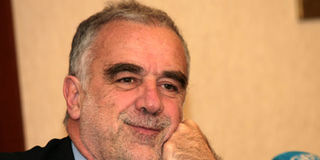Lobby faults Ocampo over sexual violence

International Criminal Court prosecutor Luis Moreno-Ocampo has been accused of letting down victims of sexual violence by conducting inadequate investigations September 21, 2011. FILE
International Criminal Court prosecutor Luis Moreno-Ocampo has been accused of letting down victims of sexual violence by conducting inadequate investigations.
A coalition of civil society groups which support the ICC’s work says that over-reliance on secondary sources and public reports by the prosecutor had seen 33 per cent of the gender-based violence crimes brought before the court in the last year dropped.
They urged the office of the prosecutor to reopen investigations into the sexual crimes committed in Kibera and Kisumu after the 2007 elections, saying victims had been let down by Mr Moreno-Ocampo’s investigative team.
“Our review of the reasons why judges keep rejecting gender based violence charges are the generous use of secondary material and public reports by the office of the prosecutor,” said Ms Brigid Inder, executive director of the Women’s Initiative for Gender Justice, a Hague-based advocacy group.
“We have condemned this over-reliance on secondary material and would like the office of the prosecutor to carry out more primary investigations before relying on secondary sources rather than relying on secondary sources and then conducting investigations.”
The criticism of the prosecutor by the civil society groups is notable because it comes from a group of NGOs that are dedicated to the support of the work of the ICC.
The press conference where they spoke was convened by the Coalition of the International Criminal Court (CICC), which works to encourage support for justice for victims of crimes against humanity.
Ms Inder said her condemnation of the prosecutor’s investigations did not necessarily reflect support of similar claims by the defence of Eldoret North MP William Ruto or former Congolese rebel leader Thomas Lubanga. “Our documentation does not support the Ruto or Lubanga thesis. We do not know all the evidence in their case because of confidentiality requirements and the considerable redaction of evidence,” she said.
Ms Elizabeth Evenson, senior counsel of the International Justice Programme at Human Rights Watch, urged the office of the prosecutor to reopen investigations into police violence in Kibera and Kisumu.
Judges rejected the demand by the prosecution for the charging of Head of Public Service Francis Muthaura, Finance minister Uhuru Kenyatta and Postmaster general Hussein Ali for attacks which occurred in those two locations saying that there was insufficient evidence.
Ms Inder said they had opened a review of why so many gender-based violence charges were being dropped by various judges at the ICC.
“We were concerned by this pattern. In the case of Jean Pierre Mbemba 70 per cent of charges were dropped. We started to focus as early as we could to get information on why this was the case and to examine the cases from the earliest instance when we had information, which was at the stage of issuing of summons or arrest warrants. We found that consistently judges say there is insufficient evidence or no evidence. As part of that review we discovered overreliance on secondary sources.”
Responding to a question from the Daily Nation Mr Moreno-Ocampo said the accusation that his office had not conducted sufficient investigations was erroneous.
“Some NGOs and lawyers will have different views,” he said. “The main thing is that I have to search for the evidence and the judges make their decisions and unfortunately on this one they made the decision they did. I agree that Kisumu and Kibera are very important and very serious. In fact we have uncovered new evidence and we know that some of those in Kibera were Mungiki in police uniform. We will revisit this.”




